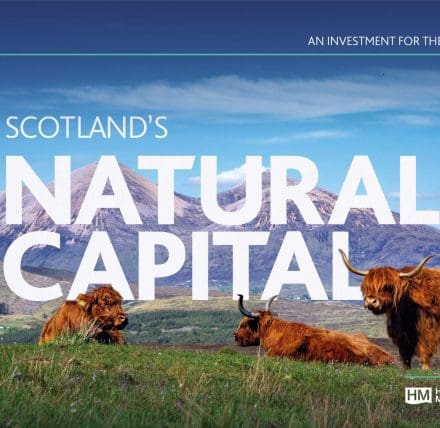


Scotland’s natural capital is an investment for the future – read our report
INSIGHTS
Natural capital is defined as the world’s stock of natural resources. Our air, water, soil, flora and fauna. These elements help us to produce goods and services which are essential to our society and economy. We shouldn’t underestimate how lucky we are, or the importance of using our resources responsibly.
The term natural capital was first coined in the early 1970s by the German economist E.F. Schumacher, in his book Small Is Beautiful, which is regarded as one of the most influential books to be published in the modern era. Today, natural capital is no longer just an economic theory, but a term used widely to encompass a broad range of parties and issues from investors, owners and regulators, to food security, travel and tourism, climate change and biodiversity.
As professional advisors, we have a vested interest in the utilisation and responsible management of Scotland’s natural capital. These resources are often thought to be in rich supply, but are carefully and expertly administered to ensure they benefit Scotland as a whole – today and for generations to come.
In recent years, the focus within the natural capital sphere has very much been on the reduction of carbon emissions, particularly by businesses and organisations. Increasingly, this has led to carbon offsetting through the purchase of carbon credits generated by natural capital projects. In the UK these projects are primarily peatland restoration and woodland creation.
This is why we held two discussion-led events recently on the future of Scotland’s natural capital focusing on peatland restoration and woodland creation projects. We brought together a range of views and voices to lay out the issues which matter most, the opportunities and challenges, and ideas for the future. As part of these discussions, we also visited a peatland restoration project on the Wyvis Estate north of Inverness. This visit allowed a range of advisors and stakeholders in the sector an understanding of the practicalities involved in delivering a project of this nature.
We assembled those representing land owners, developers, policy makers, project funders, representative bodies and professional advisors. We covered areas such as private and public sector collaboration, how communities can benefit from the increased amount of investment in Scottish land, and the importance of protecting our food security, biodiversity and natural habitats.
This report looks to cover as much of that discussion as possible, appreciating the fact that there are both harmonious and conflicting viewpoints.
What is clear is that so many different parts of our society and economy come together to contribute to and benefit from Scotland’s natural capital. There is a shared belief and understanding that Scotland’s natural resources are fundamental to a healthy and resilient economy, as long as they are managed respectfully and sustainably.
Everyone recognises the contribution Scotland’s natural capital makes to the economy in job creation, food production and the vital role it plays in helping the country achieve its net zero ambitions.
The topic of carbon credits and investment in Scottish land was central to our discussions. It is also evident that different parts of the economy are willing to get involved. Collaboration and clarity will be key to making the most of our natural resources in a responsible manner.
The role of communities will also be important. Projects such as peatland restoration or woodland creation require highly skilled people who understand their local areas.
This report is not intended to be an analysis of the economics or politics around natural capital, but a reflection of what we heard around the tables. In order to encourage an open and healthy debate we will not be quoting any of our participants directly.
We also created a short video following a visit to a peatland restoration project on the Wyvis Estate near Inverness.
About the authors
RELATED
CONTACT US
Call us for free on 0330 912 0294 or complete our online form below for legal advice or to arrange a call back.